During the last few weeks, there have been a plethora of articles in the international press calling for the delivery of state-of-the-art tanks to Ukraine: Challenger 2 tanks from Britain, Leopard 2 A 6 tanks from Germany, and M1 Abrams 2 tanks from the US. True, Ukraine has sought advanced western artillery, like the ATACMS artillery rocket system, state-of-the-art air defense networks, and self-propelled howitzers.
Lately, the Ukrainians have focused as well on combat aircraft, like the F-16, but US President Biden has turned them down. Still there is no question that looking at combat power and accessibility, the tank has emerged as the most desired weapons system at this point in time.
When the Russians invaded Ukraine a little less than a year ago, this was supposed to be a quick operation that would produce a rapid Russian victory. Since then, analysts in the West have differed on the state of the conflict with some predicting Moscow quashing a smaller Ukrainian army.
The tanks are key to winning the Ukraine-Russia War
At the start of the war, the Russians enjoyed a two-to-one advantage to their smaller western neighbor. Alternatively, the Ukraine’s surprising staying power has led many to predict that it might succeed at holding the Russian army at bay. In recent months the most common prediction for the war has been a stalemate.
Tanks are being perceived as the weapon needed to produce a decisive outcome, which partially explains the preoccupation on both sides with procuring them.

According to a study by the International Institute for Strategic Studies in London on how the parties are fairing now, “terrain had a considerable influence on the war.” It noted that the Russian advance was “hampered by woods and boggy ground.” The old battlefield, it was explained, was believed to have been replaced by new considerations, because of precision weapons.
However, the battle for Ukraine illustrated that maneuver warfare was still relevant for achieving victory on the conventional battlefield. These considerations naturally stressed the importance of the tank in the 21st century.
For Israel, there are important lessons. If factors like terrain and strategic depth are still pivotal for winning wars, then Israel must think twice before it concedes strategic areas in the future, like the Jordan Valley. There are always “military experts” who visit Israel and tell their hosts that in the modern battlefield, what concerned Israel’s military commanders in the past is no longer relevant.
However, wars are not won with air power and missile strikes alone. The assertion that they are is simply untrue. The war between Russia and Ukraine vividly illustrates that this is still the case.
The writer was director-general of the Foreign Ministry and Israel’s ambassador to the United Nations.
